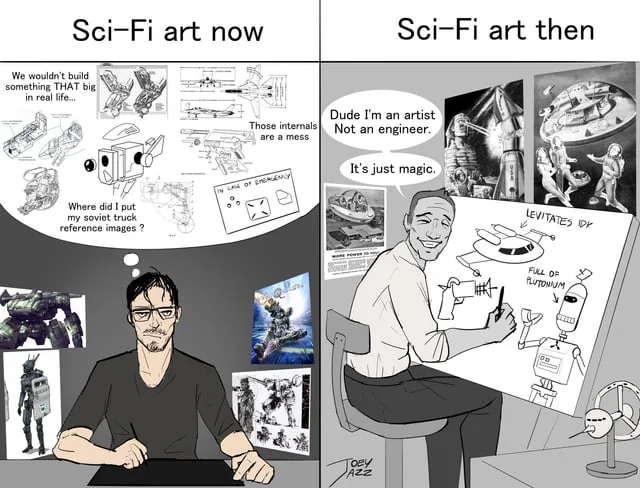this post was submitted on 03 Mar 2024
366 points (100.0% liked)
196
16511 readers
2499 users here now
Be sure to follow the rule before you head out.
Rule: You must post before you leave.
founded 1 year ago
MODERATORS
you are viewing a single comment's thread
view the rest of the comments
view the rest of the comments

there's still goofy magic sci-fi designs now, and there have always been more 'realistic' designs based on (to varying degrees) real scientific and engineering knowhow. the only way one could come to this conclusion would be by cherry-picking your examples. if you compare 'the jetsons' to 'mass effect', sure, it supports your conclusion, but on the other hand, contrasting 'rick and morty' against '2001: a space odyssey' would give a rather different conclusion.
I finished reading Dragon's Egg (1980) recently and at the back of the book was schematics, drawings, and layouts describing the various things in the novel.
There, indeed, have always been varying levels of "hardness" in sci-fi.
Yup. And in the past they didn't have as much scientific knowledge as we do now. So past sci-fi has a lot of concepts that seemed legit back then, but later we found out things simply don't work that way. And there's also ideas of things that would work, but we found better solutions that are more economically feasible later on.
A shuttlecraft that's basically a box with some cylinders strapped onto it made sense in the 1960s. Cylinders are like rockets, what we used for propulsion to get to space. Aerodynamics? Who cares?
But knowing what an actual space shuttle looks like makes people more likely to design something closer to that. And there's a greater understanding of the importance of aerodynamics when entering an atmosphere by everyone so people are less likely to buy into a new design that doesn't make these considerations unless there's some nostalgia involved.
Exactly, what is believable space travel before the space race should be different to what’s believable space travel at the end of life of the international space station. Even beyond what the experts know, now we know more too. In the 60s it would make perfect sense for people to bring orienteering gear onto a new planet, but now it would be ridiculous to not have exploratory vessels have the ability to set up a temporary gps with satellite drones. GPS is an everyday thing that just makes sense to people today.
I just want to say, i loved Dragon's Egg for this level of detail to the physics. I even did some quick calculations why you want 6 compensator masses not less to reduce the effect of tidal forces. Or the black holes inside the sun, at first i thougt, this is impossible. Then i read some more on it an noticed its well researched.
I really love The Expanse for that, but it also ruined basically every other sci-fi for me.
There's a few inaccuracies in The Expanse too.
Yep. There's that one episode I can't watch because most of it is the Roci somehow just floating ~10 metres above the surface of Ganymede and how it took only an hour or two to transit all of the Jovian moons... was that another episode? I don't know, I never watch them. ;_;
Nevertheless, the way their ships are designed so that the thrust vectors of the engines match with humans not falling to their deaths when a hallway becomes hole.
Yeah that maneuver would work... if you had a few years to do it. But it was a race against the clock kind of episode they were doing that in.
Also the idea of spinning asteroids (like Ceres) to make artificial gravity was a good idea at the time. But the general consensus now is that asteroids are more like balls of gravel so if you spin them up, they'd just fly apart.
But it's a great show despite the nitpicks. The ship designs are awesome and needing to do a flip and burns and stuff like that is cool to see.